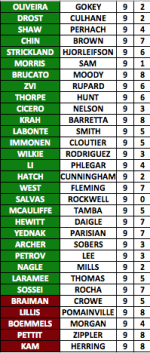Cleary and I have went countless rounds with Mike about this very thing and I think we all have to just to agree to disagree - at least for now till we see what happens later on.But yes, I totally agree with you that this is a major flaw and just can't seem to wrap my head around " it just doesn't matter " explanation .
Mike explained it in post #18 but I can totally see where lots of people won't be able to comprehend and understand how it is able to work. The best thing for someone in your position to do to put their mind at ease about it is to try to think of the people you know that play mostly on bar tables, and those that play mostly on 9 footers (or whatever other two table sizes). Look up their Fargo ratings and try to find guys from each group who have ratings that are very close to each other, like maybe you will find someone who is around a 620 speed from each of the groups, and you might also find two others who are about a 550 rating, one from each of the groups, etc. Then ask yourself if you believe they are actually pretty evenly skilled just like their ratings suggest. Ask yourself if they have fared about equally when they have faced each other in local tournaments, or when they have gambled together (they splits wins and often have tight matches etc). Ask yourself if say the 620 you can think of from each of the groups would be a close match if they were to play on say an 8ft table.
I think you will also find that the people who are rated the same, play about the same, even if each plays primarily on different sized equipment from the other. Mike has also found the same thing, over and over and over, because he isn't relying on a hope or a theory that the FargoRate system can deal with this issue, he has tested it out and proved it out repeatedly that in "real life" people that are rated the same end up being pretty evenly matched even when they primarily play on different size equipment and that FargoRate does in fact effectively deal with this issue.
Last edited:
